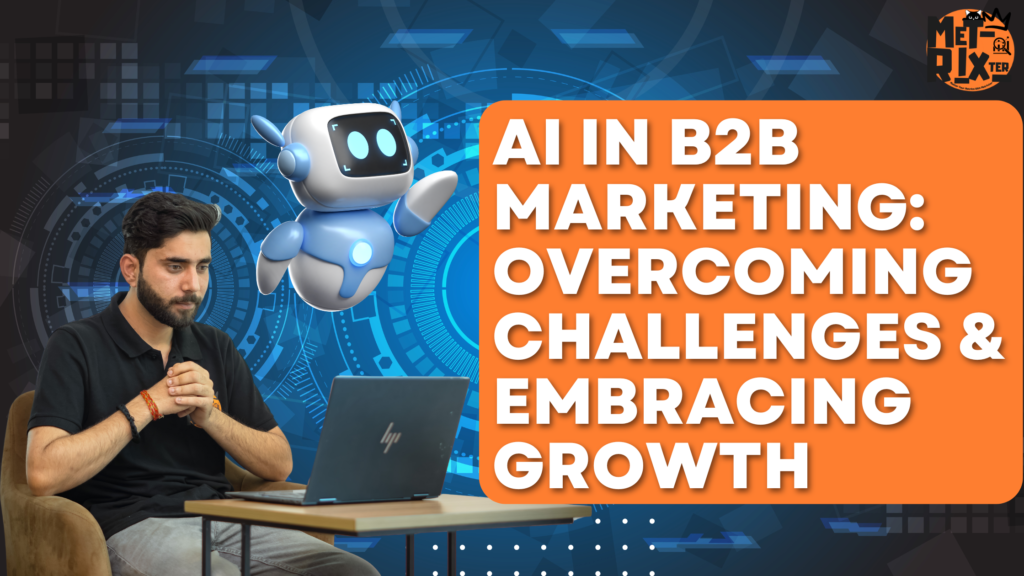AI in B2B Marketing: Overcoming Challenges & Embracing Growth

Artificial Intelligence (AI) is no longer a futuristic concept; it is deeply embedded in modern marketing strategies, especially in the B2B sector. Despite its transformative power, 72% of B2B marketers feel overwhelmed by AI, struggling to integrate it effectively. However, AI is not just an optional tool—it is the driving force shaping the future of marketing. The key is understanding how to leverage AI without being intimidated by it. Why Are B2B Marketers Overwhelmed by AI? The rapid evolution of AI technologies has left many marketers feeling unprepared. Here are some common challenges they face: How AI is Already Transforming B2B Marketing Despite these challenges, AI is proving to be a game-changer in B2B marketing. Here’s how AI is already shaping the industry: 1. Enhanced Personalization and Customer Experience AI enables hyper-personalization by analyzing user behavior, purchase history, and engagement patterns. Businesses can now deliver highly targeted content, improving customer experience and increasing conversion rates. For instance, AI-driven chatbots provide instant customer support, guiding prospects through the sales funnel without human intervention. 2. Predictive Analytics for Better Decision-Making Predictive analytics powered by AI allows marketers to anticipate customer needs before they arise. By analyzing historical data, AI can predict buying patterns, helping businesses tailor their marketing campaigns for maximum impact. 3. Automated Content Generation and Optimization AI tools like ChatGPT and Jasper AI help marketers generate high-quality content quickly. AI can also optimize content for SEO by suggesting keywords, improving readability, and analyzing competitors’ content strategies. 4. AI-Driven Email Marketing AI-powered email marketing platforms analyze user engagement, open rates, and click-through rates to personalize email campaigns. AI can also optimize send times, subject lines, and content recommendations to improve performance. 5. Intelligent Chatbots and Virtual Assistants AI-driven chatbots are revolutionizing customer interactions. These bots handle inquiries, qualify leads, and even nurture prospects by providing relevant content, allowing sales teams to focus on closing deals. 6. AI in Social Media Marketing AI analyzes social media trends, sentiment, and engagement, allowing marketers to create data-driven campaigns. AI-powered tools like Hootsuite and Sprout Social offer predictive analytics to determine the best times to post and suggest content based on audience preferences. 7. Account-Based Marketing (ABM) Optimization AI helps B2B marketers refine their ABM strategies by identifying high-value accounts, analyzing firmographic data, and predicting which prospects are most likely to convert. This leads to more efficient targeting and higher ROI. Overcoming the AI Overwhelm: How Marketers Can Adapt Feeling overwhelmed by AI is natural, but marketers can take specific steps to integrate AI successfully: 1. Educate Yourself and Your Team Invest in AI training programs, webinars, and industry events to stay updated. Understanding AI’s capabilities will make it easier to adopt and leverage it effectively. 2. Start Small and Scale Gradually Rather than overhauling your entire marketing strategy, start by integrating AI in one area—such as email automation or predictive analytics—and expand as you gain confidence. 3. Leverage AI-Powered Marketing Tools Many AI tools are designed to simplify marketing efforts. Platforms like HubSpot, Marketo, and Salesforce Einstein provide AI-driven insights that can improve marketing efficiency. 4. Focus on Data Quality AI is only as good as the data it processes. Ensure your data is clean, well-organized, and relevant for AI-driven insights to be accurate and actionable. 5. Balance AI with Human Creativity AI can handle data-driven tasks, but human creativity is irreplaceable. Use AI to enhance—not replace—your marketing strategies. The best results come from a blend of AI efficiency and human ingenuity. 6. Address Ethical Concerns Implement AI responsibly by ensuring transparency in data collection and usage. Be mindful of biases in AI algorithms and prioritize customer privacy and compliance with regulations like GDPR. Conclusion: AI is Here to Stay—Embrace It AI is not just the future of B2B marketing—it’s already shaping the present. While 72% of marketers feel overwhelmed, those who embrace AI will gain a competitive edge. By understanding AI’s potential, leveraging the right tools, and integrating AI with human creativity, businesses can achieve unprecedented marketing success. The key takeaway? AI isn’t here to replace marketers—it’s here to empower them. Embrace the change, and let AI take your B2B marketing strategy to new heights. Looking to optimize your digital marketing strategy with AI? Metrixter, the leading digital marketing agency in Noida, can help you navigate the AI-driven landscape with cutting-edge solutions. Contact us today to take your marketing efforts to the next level! FAQs AI in B2B marketing refers to using artificial intelligence technologies like machine learning, predictive analytics, and automation to optimize marketing strategies and improve customer engagement. AI analyzes customer data and behavior to deliver hyper-personalized content, product recommendations, and email marketing campaigns. No, AI enhances marketing efforts by automating repetitive tasks, allowing marketers to focus on strategy and creativity. Popular AI tools include HubSpot, Marketo, Salesforce Einstein, Jasper AI, and Hootsuite for automation and data-driven decision-making. AI helps with keyword research, content optimization, and analyzing competitors to improve search engine rankings. Yes, predictive analytics powered by AI can forecast customer needs based on historical data and trends. Small businesses can use AI-powered tools for email marketing, chatbots, and social media automation to enhance efficiency. AI tools vary in cost, but many affordable options exist for businesses of all sizes. Issues like data privacy, algorithmic bias, and transparency must be addressed to use AI responsibly in marketing.
